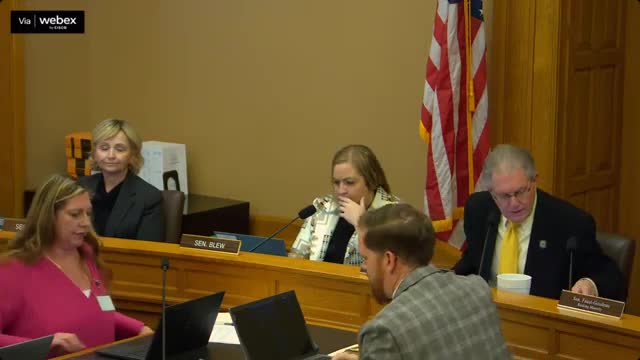Panel weighs bill to require governor pick vacancy appointees from three legislature‑approved nominees
Get AI-powered insights, summaries, and transcripts
Subscribe
Summary
A Kansas Senate committee heard testimony Wednesday on Senate Bill 105, which would require the governor to appoint temporary replacements for vacancies in the U.S. Senate, state treasurer and commissioner of insurance from a list of three individuals approved by a legislative joint committee.
A Kansas Senate committee heard testimony Wednesday on Senate Bill 105, which would require the governor to appoint temporary replacements for vacancies in the U.S. Senate, state treasurer and commissioner of insurance from a list of three individuals approved by a legislative joint committee.
The bill’s sponsor staffer Jason told the committee, “Senate bill 105 addresses when there are vacancies in the office of a US Senator, or in the state elected offices of state treasurer and commissioner of insurance,” and summarized that the change would make the governor choose an appointee from a slate of three names approved by the legislature rather than name a temporary replacement unilaterally.
Supporters said the change would add a layer of legislative review and help preserve continuity in statewide offices. State Treasurer Steven Johnson told the committee he favored the bill as “a more robust process to be able to consider something different in the people that we would look at to fill those vacancies,” saying it could reduce disruptive staff turnover in executive offices.
How the slate would be produced: under the bill a special 12‑member joint committee on vacancy appointments would be convened within 10 calendar days of a vacancy and must hold its first meeting within 30 days. That committee — composed of legislators appointed by Senate and House leadership and chaired by the Senate president or designee with the speaker or designee serving as vice chair — would conduct public hearings, recommend three names in concurrent resolutions to each chamber, and, if adopted, those three names would be submitted to the governor to select one appointee. If the legislature is not in session, the committee would submit its report directly to the governor.
The bill requires any temporary appointee to be a Kansas resident and to be registered with the same political party as the official who vacated the office; committee staff said the bill also includes a six‑year party‑registration requirement for the appointee and directs that the nominating process reflect representation across Kansas’s congressional districts.
Kansas Secretary of State general counsel Clay Barker testified neutrally and urged changes to address timing problems in current law. Barker described a longstanding statutory timing gap — part of the interpretation of the Seventeenth Amendment and the state's 1927 statute — that could force a special election on very short notice if a vacancy falls close to an election filing deadline. He recommended adding a cutoff date or other timing rule so a vacancy would not trigger an unworkable immediate election schedule. Barker said the state has avoided triggering that timing problem in past vacancies but that the bill should explicitly address it going forward. He told the committee the secretary of state’s office is available to work on the mechanics.
Several senators raised other technical questions in the hearing: whether legislators could be considered as nominees (the bill contains no bar to committee members being nominated), whether the committee would be a standing body (it would not; it convenes only when a vacancy occurs), and how the rule would interact with the Kansas Constitution for offices that are filled under constitutional provisions (the staff briefing noted the attorney general and secretary of state are constitutional offices and would require a constitutional amendment to change their vacancy processes).
No formal vote or amendment was taken in the hearing. The committee chair said members expect further drafting and discussion before a work session; the committee scheduled a separate hearing for Monday on Senate Bill 65 and noted several agenda items remain to be assigned.
Questions and testimony during the hearing referenced historical instances in Kansas — including past U.S. Senate vacancies — and emphasized two recurring issues the committee plans to address in follow‑up work: the statutory timing for when a replacement must be elected, and conflict‑of‑interest or recusal rules for committee members who might be eligible to be nominees.
